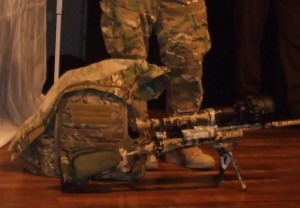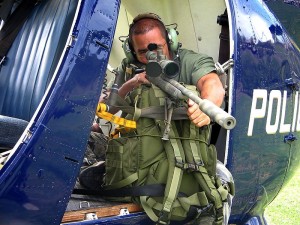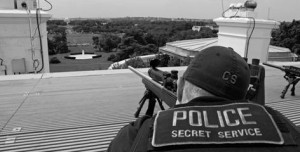Sniper: an expert marksman that operates from a concealed position some distance from the target, usually having the additional advantage of elevation.
Snipers have been used as an effective strategy in fighting wars for over 200 years. They came into use in law enforcement as a way to combat domestic terrorism without involving the military. There is more to it than being a great shot, and there are several differences between police and military sniper jobs as well as different types of training involved.
A law enforcement sniper in a SWAT (Special Weapons and Tactics) unit generally operates as part of a team in hostage situations or other hi-risk events, sometimes to provide protection, sometimes to eliminate the threat of a specific target. The targets are generally under 100 yards away and the assignments are usually completed in a few hours. Police snipers shoot only as a last resort.
A military sniper works with a spotter or a team to protect and defend his military unit from harm while they are on assignment during wartime. He is typically shooting from a higher, concealed place, so that he can spot the enemy and alert the troops below of enemy movement. On occasion, a military sniper is shooting at a target 1000 or more yards away. The record for a long distance confirmed kill shot is currently held by British Army CoH Craig Harrison, achieved in November, 2009, at a range of 2,707 yards.
SWAT team members have sometimes entered law enforcement after serving in the military, so if you’ve ever wondered what it takes, here are some of the requirements from both military and civilian routes.
Each of the branches of the military has similar basic training programs, but vary slightly because of the specific needs of each.
Potential Marine Snipers (like Special Agent Gibbs on NCIS) can expect a rigorous thirteen-week training schedule after Marine Boot Camp and then additional training, depending on the specialty.
While in Boot Camp the candidates must attain at minimum:
- Expert rating with rifles
- Physical Fitness Test (PFT) with a first class score
- Swimming test – including 30 minutes treading water and testing whether the recruits can survive in the water while wearing all combat gear (rifle, helmet, flak jacket and pack)
- 20/20 vision, no color blindness
There is Infantry Training after Boot Camp where the candidate may volunteer for scout/sniper school at either Recon School or at the Infantry Battalion. The candidate must have scored well on the Armed Services Vocational Aptitude Battery (ASVAB), have no Courts Martial on record, be of sound mind, and have achieved the rank of at least Lance Corporal.
Just in case you’re wondering what is required past the basic Physical Fitness Test (which is mostly about cardio fitness and endurance while wearing workout clothes), all Marines must now complete a Combat Fitness Test while wearing the complete uniform (boots, etc)
Combat Fitness Test Requirements
| Males | |||
| Age | 880 Yard Run | Ammo Can Lifts | Maneuver Under Fire |
| 17-26 | 3:48 | 45 | 3:29 |
| 27-39 | 4:00 | 45 | 3:55 |
| 40-45 | 4:19 | 44 | 3:57 |
| 46+ | 4:30 | 43 | 4:28 |
Army Sniper
It is suggested that a candidate for an Army Sniper spot must be great at math and science, in order to know how to adjust the angle of a shot for wind speed, direction and target range.
They should have learned the basics of marksmanship and have entered shooting competitions before enlisting in the Army.
Graduating from Advanced Infantry Training (AIT) means that you have passed the minimums. You are given two minutes for each: pushups and sit-ups. The two-mile run is timed. The chart below shows minimum requirements.
|
Age Group |
Gender |
Push-Ups |
Sit-Ups |
2-Mile Run |
|
17 – 21 |
Male |
42 |
53 |
15:54 |
|
Female |
19 |
53 |
18:54 |
|
|
22 – 26 |
Male |
40 |
50 |
16:36 |
|
Female |
17 |
50 |
19:36 |
After graduating from Boot Camp, the candidate will wait for a sniper opening and then try out.
It is possible to become a spotter for a sniper as an alternate plan. Spotters go along to protect and defend the sniper from enemy attack and keep track of the enemy while helping the sniper adjust his shots.
Navy SEAL Sniper During training, the candidate learns about digital photography, computer imaging and satellite communication.
After the technical part is mastered, he also learns about camouflage, patrolling, and how to get in and out of hostile territory without leaving any trace behind – not even bullet casings.
Advanced marksmanship is only one part of this training. No out of shape hunters need apply. Navy SEALS have one of the most demanding physical training regimens anywhere.
FBI Sniper FBI snipers are part of elite SWAT and Hostage Rescue Teams (HRT)
They must be able to work independently and in team situations, since they often arrive at the scene before any local task force and have eyes on the targets before anybody else does.
Minimum requirements for the FBI:
- The candidate must be 23-37
- Four year college degree
- Three years on the job experience.
- Must pass a variety of physical, medical and drug tests and interviews.
Then, if accepted, candidates attend the FBI Academy in a 21 week training program, then serve in a field office for at least two years.
After the two years, they can volunteer for SWAT or HRT training and then must attend Marine Sniper Course for 12.5 weeks.
Every field office has its own SWAT team.
Still want to be a sniper? Before you open the door to the recruiter’s office, think.
- Do you have what it takes to get through all the training?
- Can you handle the intensity of the job?
- Are you good at waiting?
- Can you lie on the ground, motionless for long stretches at a time?
- Are you patient?
- Are you capable of pulling the trigger and actually making the kill shot?
For more information about sniper training, click on the links below:
http://www.fbiagentedu.org/careers/tactical-operations/become-sniper-in-fbi/
http://www.military.com/military-fitness/army-fitness-requirements
http://www.telegraph.co.uk/men/thinking-man/10740415/What-does-it-take-to-be-a-military-sniper.html
http://army.com/new-fitness-and-combat-readiness-tests
*Photos of Police and Secret Service snipers courtesy of Wikipedia.




Patti-
Nice piece on snipers and for providing all the resources links.
Incredibly demanding profession. I didn’t know so much more was expected than being a good shot. But the physical expectations make sense.
Thanks!
Thanks, Tom. Prior to doing the research for this post, I had thought that any good shot could show up and be hired with minimum training in other areas. The world has changed so much that the training has had to keep up with the times.
Sit-ups. Yes. Nothing else, not even good vision!! Let alone coping with the fear factor. My husband & I went to see American Sniper last week. Incredible movie. My life is so easy and so blessed. I am grateful to our service people, our law enforcement people, fire fighters, medical people. Sometimes it’s so necessary to take time out for gratitude!!
Sue, I think my weakness would be maneuvering under live fire. I jump at loud noises. Not such a good thing for a sniper.
Seeing American Sniper reminded me that the men and women that protect us each and every day, never get enough credit and/or thanks for their service and sacrifice. We are indeed fortunate.
Interesting piece on snipers. I am surprised there is little or no psychological background checks and counselling. After-all you are being expected to murder someone and I would have thought this ‘profession’ might attract all the loonies and sadists and similar types. It takes a certain kind of human to put another in their gun sights and pull the trigger – killing strangers – for the State is a strange thing to aspire to do. I neither condone or condemn them; just wonder.
Hi Jane,
There are several levels in the training process in each of the branches that will ferret out the loonies, thank goodness. This generally happens before any of the candidates finish Boot Camp. I have been told that someone does take a look at the mental stability of the applicants at several points along the way. Counseling has become a part of the debriefing process at the insistence of both military and civilian personnel.
Having said that, my impression has been that aspiring to be a sniper is about ‘getting the bad guy’ and/or ‘defending the troops on the ground.’ It does take a mental toll, as we saw in the movie, “American Sniper,” and you’re right, not everyone is cut out for the job.
I just wrote a long reply to you only to have it disappear. Now I need to think what I wrote and will try again later when I have time. Fascinating topic.
Looking forward to it, thanks, Jane!